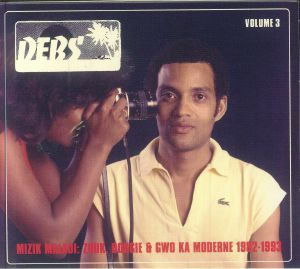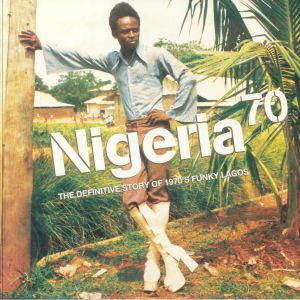Back catalogue: Funk/Reissues
Juno's full catalogue of Funk/Reissues
专辑
VARIOUS
Cat: STRUT 190CD. Rel: 13 Mar 25
Review: Strut continues to explore the vast archives of Disque Debs, a long-running, Guadalupe-based label that, over the course of half a century, released a wealth of music from the Caribbean. In the process, Henri Debs imprint helped launch the careers of countless French-speaking artists while not only showcasing stylistic movements such as zouk, bouyon and merengue, but also bold, colourful and tropical takes on existing Caribbean, Amercian and European sounds. Highlights include - but are in no way limited to - the slowly unfurling, synth-heavy shuffle of Sadi Lancreot's club-ready 'Dou Se Vou Ki Siwo' and the horn-heavy tropical disco brilliance of Dominuque Parol's 'Come On Baby'.
… Read more in stock $10.21
VARIOUS
Nigeria 70: The Definitive Story Of 1970's Funky Lagos (gatefold translucent green vinyl 3xLP)
Cat: STRUT 44LPC. Rel: 29 Aug 24
Review: Strut's definitive vinyl edition of Nigeria 70 brings fresh vitality to a landmark compilation first released in 2001. This collection, renowned for its role in popularizing 1970s Lagos music, remains a vital exploration of Afro funk and Afro jazz, showcasing a vibrant cross-section of Nigerian music that extends beyond Fela Kuti's legacy. The reissue offers a rich tapestry of sounds that captured Nigeria's dynamic musical landscape. Starting with Monomono's 'Loma Da Nigbehin,' the album dives into deep, rhythmically complex Afrobeat grooves. Fela Kuti's iconic tracks 'Upside Down' and 'Jeun Ko Ku (Chop 'n' Quench)' highlight the revolutionary funk that defined the era, while Tony Allen's 'No Discrimination' from 1980 exemplifies the genre's evolving sophistication. The compilation's strength lies in its diversity. Tracks like Ofo & the Black Company's 'Allah Wakbarr' and BLO's 'Chant to Mother Earth' introduce psychedelic rock influences, while Joni Haastrup's 'Greetings' and Shina Williams & His African Percussionists' 'Agboju Logun' infuse disco and electro-funk elements into the Afrobeat foundation. William Onyeabor's 'Better Change Your Mind' offers a glimpse into how Nigerian artists engaged with global funk and synthesiser sounds. Nigeria 70 is a great example to the innovative spirit of Nigerian music in the 1970s, reflecting a rich interplay of local and global influences.
… Read morePlayed by: THE REFLEX, Juno Recommends International
in stock $38.36
VARIOUS
Mizik Maladi: Disques Debs International Vol 3 (remastered) (gatefold 2xLP)
Cat: STRUT 190LP. Rel: 13 Mar 25
Review: Strut introduces the highly anticipated third volume in the Disques Debs International series, diving deeper into the archives of one of the greatest French Caribbean labels, Disques Debs, based in Guadeloupe. Founded by Henri Debs in the late 1950s, the Debs studio naturally doubled as a record label and ran for over 50 years, releasing more than 300 7" singles and 200 LPs, cementing it as one of the foremost record labels to prize Caribbean music history. Not just limited to Guadeloupean musicians but also Martinicians and Parisians, the likes of Jocelyn Mocka, Mariz, Dominique Parol, Christian Yeye and Alex Rosa make this a thixotropic record, mercurial and restless as it is rooted in forms of zouk, biguine, gwoka and, of course, the nascent electronica. This third volume flaunts the label's dynamic latter-day period, as it interpreted the analog electronic dreams of the 1980s.
… Read morePlayed by: Mukatsuku Records Chart, AfroBase (Radio Chart)
in stock $29.26

 USD
USD









